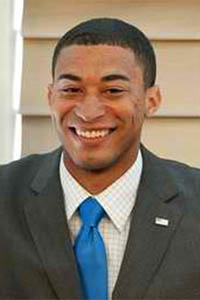Local African American community weighs in on President Obama’s term
Traci Easley Williams went to Washington D.C. in 2008 for President Barack Obama’s inauguration and said she looks forward to being in his presence again during his visit to Kent State’s campus Wednesday.
“I’m ecstatic,” Williams said. “The Obama family, they’re such wonderful American role models. As a professor who teaches a course called black images, I am so proud.”
Williams, a lecturer in journalism and mass communication and Pan-African studies, said people of color see so many negative images of themselves in the media that they start believing that those images are true. She said the Obama family is important because it shows the world that people of color can have loving relationships with their spouses, value education and hard work and love and nurture their children.
“Raising an African-American boy, I can literally say to him, ‘One day, you can be president of the United States.’ He knows who President Obama is,” Williams said about her 6-year-old son.
Ephraim Butler, director of political affairs for Black United Students, said although Obama didn’t fulfill all of his promises he made in 2008, he still thinks the African-American community will support him because he is revered as a cultural icon.
“For the black community, he means hope,” said Butler, a sophomore communication studies major. “It’s good to see someone in that role. A lot of times, the only role we might see people like ourselves in, as far as in the media, are people that are athletes or entertainers.”
Amoaba Gooden, interim chair of Pan-African studies, said on a global scale, he is an international icon.
“People saw him as kind of a balance, a way for people of color to negotiate their presence in the world,” said Gooden, who is African-Canadian. “He represents so much for so many people. Because of the history of enslavement and internal colonization in the States, he represents the possibility that there is not a concrete ceiling to the limits of achieving for African-Americans.”
Kayla Ivey, sophomore chemistry major and member of the College Democrats, said Obama has tried to fulfill the promises he made four years ago but has been blocked by a Republican Congress. She said Obama is a cultural icon for the African-American community because he was elected to a high office often seen as unattainable for people of color.
“He has shown the African-American community, and me particularly, that nothing is impossible, and with hard work and a strong mind you can achieve anything,” Ivey said.
Sam Bain, chairman of the Ohio College Republican Federation, said Obama had significance initially for the African-American community being the first black president, but any other significance he had has been wasted with his policies.
He said he thinks a president should not be viewed as a cultural icon.
“He’s a cultural icon because he seems more concerned about being a celebrity and hanging out with Jay-Z and Beyonce, while our ambassadors are being killed in the Middle East,” said Bain, a senior at Sinclair Community College in Dayton. “He’s a cultural icon in the aspect that he cares more about being a celebrity than he does about doing his job as president.”
Contact Madeleine Winer at [email protected].



